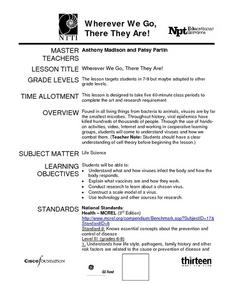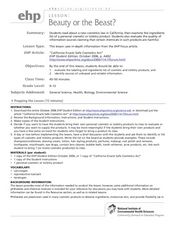Curated OER
Changing Planet: Infectious Diseases Classroom Activity
Here is a different approach: emerging epidemiologists first go home to interview family on the topic of infectious disease. Then they come to class and view a video and PowerPoint that explore how climate change may increase the...
Baylor College
How Much Water Do Humans Need?
Physical or life science learners measure the amounts of water eliminated by intestines and the urinary system, and the amounts lost via respiration and perspiration. In doing so, they discover that the body's water must be replenished...
Baylor College
Plant Parts You Eat
Plants provide a variety of delicious foods essential for human survival. In the fourth lesson of this series on food science, young scientists investigate common fruits, vegetables, and grains in order to determine which plant part is...
Baylor College
Bio Build-up
Trace pollutants through the environment in the seventh lesson of this series on the science of food. Looking at a picture of the plants and animals in an aquatic ecosystem, learners use dot stickers to represent harmful chemicals as...
Baylor College
They're Everywhere: Bacteria
Totally gross out your class with the eighth instructional activity in this series on food science. Explore the microscopic world of bacteria by taking swabs of different classroom objects and growing colonies in petri dishes. An...
Baylor College
What's That Food?
Get things cooking with the first lesson plan in this series on the science of food. Working in small groups, young scientists make and record observations about different mystery foods. These descriptions are then shared with the class...
Baylor College
Healthy Snacks
Assess your pupils' ability to identify healthy food choices in the final lesson of this series on food science. Given five different food labels, young nutritionists will rank them from most to least healthy, supporting their choices...
Baylor College
Using Food Labels
Help your class make sense of nutrition labels with the ninth instructional activity of this series. After explaining the different information provided on packaged food labels, perform an activity that demonstrates the amount of sugar...
Curated OER
Be Kind to Your Teeth
What kinds of food can be bad for your teeth? Kindergartners and first graders explore dental health with an interactive science inquiry. Given a choice of foods such as celery, cake, and milk, kids choose which ones are better for their...
Curated OER
Body Parts
For this science worksheet, students identify the placement of the main parts of the human body. Students begin by cutting out the head and torso pieces and pasting them and the smaller body parts in the proper location.
Curated OER
Good Drugs, Bad Drugs
Add a science experiment on medicine and drugs to your health lesson. After reading a paragraph on the difference between helpful and harmful drugs, kids choose which pictures of bottles they could find at a pharmacy. The last activity...
Baylor College
Microbes and Disease
Discuss how diseases have impacted human history. Divide your class into groups and assign each group one of the following: tuberculosis, malaria, plague, cholera, smallpox, and AIDS. They read up on, complete a concept map, and present...
Curated OER
Wherever We Go, There They Are!
The central video for this lesson is not available through the included resource link. However, the activity that simulates the passing of a virus through a population is impacting and the other resource links are invaluable. Use this...
Baylor College
Hormones and Stress
As a more personal part of a unit on brain chemistry, your class discusses stressful situations and the body's response to them. They talk about how, while the reactions are initially helpful, some can be harmful to your health. Finally,...
Baylor College
Food for the Brain
With a couple of neat diagrams on student handouts, your life science or health class will examine the contents and serving sizes of healthy foods. They dissect a slice of pizza and scrutinize the nutritional value of its components in...
Kenan Fellows
Unit 1: Introduction to Biotechnology
Biotechnology is big! Introduce the uses of biotechnology to science scholars with a fascinating, fact-filled unit. The first installment in a series of four biotechnology units covers the role biotechnology plays in human and...
Curated OER
Beauty or the Beast
Does the FDA really intend to protect public health? Spark a debate in your chemistry or health class by using this article, titled "Beauty or the Beast." It questions the safety of cosmetics and toiletry products, govenment regulations,...
Horticultural Society of New York
Dress Up Your Salad
Salad dressings use a variety of different ingredients, but it's important to have a healthy balance of greens to create a delicious mix. Young chefs examine five types of herbs including chives, basil, dill, parsley, and thyme to make a...
Creative Learning Exchange
The Infection Game: The Shape of Change
Encourage the spread of knowledge in your class with this cross-curricular epidemic simulation. Pulling together science, social studies, and math, this lesson engages students in modeling the spread of infectious diseases, collecting...
Project WET Foundation
Healthy Water Healthy People
People and water have something in common. They both need to be healthy. Explore with an engaging interactive what it means to have a healthy body and why having healthy water is also important.
Curated OER
Controlling the Pandemic: Public Health Focus
Young scholars examine global issues centered around HIV and AIDS. In this health science lesson, students compare and analyze public health measures and factors that affect the treatment of HIV/AIDS. They examine the role of...
Curated OER
Science Charades
Students dramatize the wonderful world of nature, without making a sound. In this early childhood creative thinking lesson, students dramatize different aspects of nature to develop creative thinking, reading, memory, and motor skills.
Curated OER
Fruitful Questions
Learners examine a fruit-related Q & A Science Times article. They write their own food science questions and answer them in the same format as the article. For homework, they analyze their fruit consumption according to U.S....
Curated OER
Science as Inquiry: what is starch and how can we test it?
Sixth graders discuss nutrients and examine foods for starch. In this starch testing lesson, 6th graders use iodine to test foods for starch and record their results. Students complete a worksheet and self reflection.
Other popular searches
- Earth Science
- Physical Science
- Life Science
- Science Project
- Science Space
- Environment Science
- History of Science
- Environmental Science
- Pe Science
- Family and Consumer Science
- Consumer Science
- Social Science

























